Ginger for women: about the beneficial properties and possible contraindications. Useful properties of ginger for women.
About the benefits of ginger and its impact on the female body can talk for a long time. Therapeutic components of the healing rhizome have a lot of useful properties:
- powerful anti-inflammatory property;
- elimination of pain;
- the expulsion of toxic substances from the body;
- stabilization of the nervous system;
- getting rid of gas formation;
- healing of damaged tissues in the body.
100 grams of fresh rhizomes contain only 80 kcal, and at the same time, ginger contains both proteins (1.8 g), and fats (0.8 g), and carbohydrates (15.8 g), which allows you to actively use the root for weight loss . Besides this, ginger:
Ginger warms the blood, which allows its use for the treatment of colds, sore throats, inflammatory processes in the oropharynx.
During pregnancy, women use ginger tea as a drug that relieves nausea during the period of toxicosis.
What is harmful ginger for women?
Can ginger harm the female body? Of course, in addition to the benefits, any plant product has its own contraindications, in which its use should be limited.
The first contraindication is hypertension, or high blood pressure. Women suffering from this disease should not use ginger regularly, but only when absolutely necessary. For example, during cold or flu as a warming drink. If, however, it was not possible to avoid an increase in pressure, herbalists advise decoction of hawthorn - it stabilizes the pressure and normalizes heart activity.
During pregnancy ginger root not prohibited. However, in case of pregnancy pathologies, for example, with an increased uterus tone and the threat of spontaneous abortion or premature birth, it is better to refuse to eat meals with the addition of the root. Especially dangerous in such situations is pickled ginger, which most potentiates the contractile movement of the uterus.
It is also not advised to eat ginger dishes for the following diseases:
- with gastric and duodenal ulcers;
- with fever;
- with cardiovascular failure;
- with a tendency to allergic reactions to herbal preparations;
- with colitis or enterocolitis;
- with calculous cholecystitis.
Ginger Properties for Women
Ginger root has a beneficial effect not only on the internal health of the woman, but also on their appearance. Many years ago in the eastern countries, the healing rhizome began to be used as an additive to cosmetic preparations. Adding grated ginger to shampoos and rinses allowed to strengthen the hair, make the hair thicker and brighter. The most common in those days were considered recipes that are successfully used today.
- For beauty and density of hair, you must rub a piece of ginger root on a fine grater, squeeze out the juice and rub it into the skin on the head, with soft massage movements. After the procedure, you need to wrap the head with a towel and hold it for about an hour, then rinse the hair with any shampoo and warm running water.
- In order to strengthen weakened hair, take one yolk of an egg, a tablespoon of dry ground ginger root and 50 g of honey. All components are mixed and distributed throughout the hair length. Wash off after half an hour using warm running water.
Most of the women who tested these recipes were pleasantly surprised by the results.
Ginger root for women, unlike many products, can be used during pregnancy (of course, if there is no threat of termination). In order not to provoke negative consequences, it is advisable to use the root in moderate quantities - in this case, maximum benefit is expected from ginger.
The plant contains a lot of substances necessary for the body, for example, magnesium and calcium - magnesium supports the nervous system, and calcium helps to strengthen the skeletal system of the mother and the future baby.
During a cold, instead of tablets, it is better to drink freshly prepared tea with the addition of ginger, garlic and honey. This drink will put you on your feet the next morning.
Another important ginger root ability is to soothe the nervous system and eliminate the effects of stress. With the variability and instability of mood ginger tea stabilizes the condition, strengthening the nervous system and providing a positive attitude.
Ginger - aphrodisiac for women
Ginger is a truly universal plant, which, among other things, is considered a powerful aphrodisiac. In ancient times, it was customary to believe that ginger root is a stimulating plant capable of spreading a moving "inner flame", warming the blood and activating sexual function.
Women who regularly use ginger can cure themselves of most sexual problems:
- increase sexual desire;
- eliminate sexual coldness;
- get rid of inflammatory processes in the genital area;
- acquire sexuality and femininity;
- provide the body with energy and inner strength.
In order to achieve a positive effect of the plant, as an aphrodisiac, it is enough to use a small piece of root daily - about the size of a walnut. The root can be brewed with tea, added to the first and second courses, as well as desserts. Dry ground ginger powder is enough to use about ½ teaspoon per day.
Ginger with infertility in women
The properties of ginger root can also be useful for combating infertility in women. For the first time such conclusions were made by Japanese experts, who developed a new drug based on local medicinal plants, including ginger powder.
Clinical trials of the drug took place in Osaka, and 100 patients were involved in the trials. Fifty of them were given a new medicine, and the other half were given a placebo. As a result of the experiment, it was found that a larger percentage of women who took the new drug restored the monthly cycle, improved the maturation of the eggs, stabilized ovulation, normalized the level of hormones in the blood. Patients who took a placebo could not boast of such results.
If we analyze the historical facts, we can find that ginger was used in European medicine in the late XIX - early XX century. Ginger drink offered to drink to women planning to become mothers. Numerous experimental studies have received a lot of evidence that ginger root normalizes hormones, stabilizes reproductive function, cleanses the urinary system and the liver.
Ginger for women's health is a truly indispensable herbal product:
- facilitates the flow of menstruation, eliminates pain;
- makes the monthly cycle stable;
- nourishes and refreshes the skin;
- stimulates metabolism and blood circulation, including capillary;
- rejuvenates the body;
- makes the body slimmer, eliminates the extra pounds.
The list of diseases that ginger root helps relieve is really long. However, we should not forget that everything is good in moderation, so eat ginger food and drinks regularly, but do not exceed the norm.
Ginger for women - a universal remedy to maintain their own beauty and health. This is a complex natural product that can be used both as food and as medicine or cosmetics. The root is easily absorbed by the body, and not only in the digestive tract, but also through the skin and mucous membranes. Use ginger everywhere and stay healthy!
Ginger appeared in the life of a Russian person not so long ago, since the overseas guest had not been a member of our culinary delights before. Therefore, medicinal properties it was previously unknown to us, but it migrated to us from European, and especially Eastern countries, where sages learned about its healing properties for a long time and actively used it. Especially the root was valued as an aphrodisiac, helped the aristocrats, who were exhausted from the walkers and the wild life, to regain their former love power. Then they noticed his powerful wound-healing properties, noted that immunity enhances healthily, and women began to use it for their hair and skin. By the way, dandelions are very useful, look, prepare for the winter.
What is ginger and what is its use?
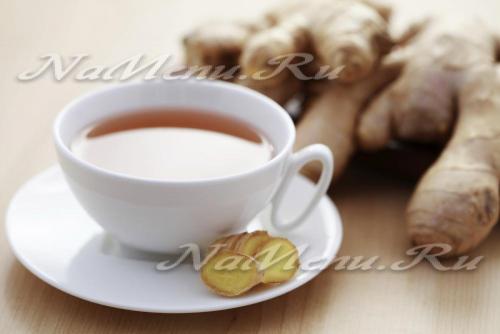
Ginger itself hails from India and Asia, this root grows there, and is commonly used as a spice. As we said above, in the ancient East, the root has become increasingly used both in cosmetology and for medical purposes. Doctors helped patients with its help to clean the intestines, to adjust the digestion, to get rid of pregnant women from toxicosis, and to some of those extra pounds. Further, its antitussive properties, which improve asthma manifestations, increase hemoglobin, were observed. Then heart anxiety, as practice has shown, leaves the person consuming ginger. It can relieve fatigue, sweep away depression from a person, relieve irritability and insomnia. In addition, important properties of the spine were noted, such as the ability to improve blood supply to the brain, increase attention, increase concentration and invigorate. It is claimed that with some forms of cancer the root can fight in an interesting way - it simply forces the enemy's destructive cells to destroy themselves, what a good fellow!
How to eat ginger
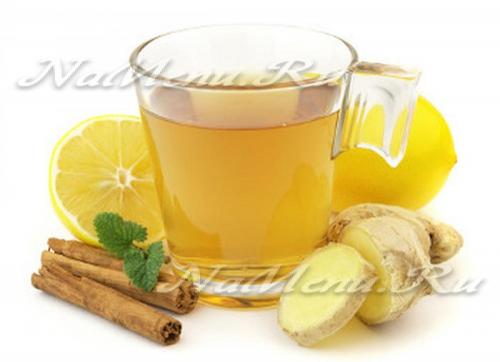
The root is used more often in the form of ground spices in cooking, also often in pickled form when serving sushi, because it has powerful bactericidal properties, and is indicated when eating raw fish for disinfection. Put the spine in the tea, brew, boil, add lemon, honey, and get an excellent healing tool. Ginger with lemon and honey is an excellent tonic and firming drink.
Infertility Ginger
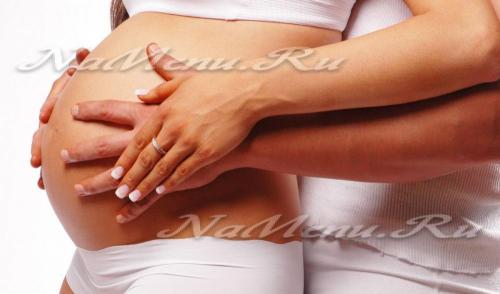
Although our traditional medicine denies the healing power of the root in terms of childbirth, in the ancient East there was no doubt about it. Therefore, there healers have necessarily added ginger to herbal preparations to help a woman become pregnant. And in India, traditionally, a ginger root is given to the wedding, the bride must plant it and go out, and then it will surely find the joy of motherhood. By the way, many European doctors also advise women in preparing for pregnancy to take ginger drinks, which normalize the hormonal system, and in addition, tone the uterus. The root, of course, will not fight with endometriosis, it will not get rid of the cytomegalovirus, but you will definitely get some help from it, and in combination with other means the result can be excellent.
During pregnancy
A good spine is for those pregnant women who suffer from toxicosis, because they can get rid of this problem. In addition, he also helps to transfer the journey to those who are rocking on the road. In the first trimester, the spine is shown in the form of teas and powders, but then it is undesirable to use it, especially if miscarriage can happen. It is better to consult on this case with a doctor and not risk it. In general, its immunomodulating properties, coupled with antimicrobial properties, can serve the future mom in good stead, eliminating the need for various medicinal drinks, which can lead to complications.
During menstruation
Ginger will help the woman and with this trouble to regularly cope, reducing pain, improving the state better than many drugs. How to cook:
Clean 1 root (medium root 50g), pour half a liter of water, boil. Turn off the fire. Cool, add honey with lemon - drink before meals for painful periods. If you have a delay - also drink a course, it may well help.
Ginger Slimming
Yes, the list of useful properties of this little freak is not yet exhausted. He may well help you get rid of excess fat reserves, unless of course, you connect more physical activity and adjust nutrition. If someone told you - drink and eat ginger, and you will become slim, that cypress - do not believe, it lies! Just because the spine does not help. Combine drinks from it with the correct program, and the effect will be stunning. Moreover, do not overdo it - 1-2 cups of drink is enough for you a day.
How to brew - grind the spine, fill with a liter of boiling water (preferably in a thermos), and after half an hour it is ready - add a bit of lemon and drink to your health.
For beauty

The root of the ginger, as we have already mentioned above, works great for women's beauty, protects against aging, improves skin. Makes hair grow better, relieves acne, tightens pores, normalizes fat secretion. If before the menstrual rash appeared on the face, inflammation - ginger will remove everything. Brush everything like a broom, improve mood and add courage.
For hair: rub the spine on the smallest terke, squeeze juice, rub into the hair roots, roll up with a towel and leave for an hour. Rinse hair as usual. The second recipe is to take ginger powder, 1 egg and a little honey, mix and apply right along the entire length of the hair for half an hour, wash it off with just warm water.
But, here, too, warnings are needed: for ulcers and gastritis - forget about ginger.
See also: - A great useful recipe.
Date: 15.06.2015 / 21:36
Ginger (lat. Zingiber) is a perennial tuber plant common in tropical latitudes in countries such as India, Japan, China, Ceylon, and central America. Ginger belongs to the spices and is one of the first spices imported to Europe from the East. In use are rhizomes of the plant.
History of use and distribution
For more than 3,000 years, this plant has been considered curative for many diseases, and in Vedic Oriental medicine, it has gained the status of a universal medicine. Ginger was first grown in northern India. It was from there, thanks to the Phoenicians, that this spice hit the lands of the Mediterranean. And already Arab merchants spread ginger to North Africa and China. Ginger came to European countries in the Middle Ages and became so popular with its inhabitants that the streets where the spice was sold were called “ginger”, i.e. ginger.
Kinds of Ginger
Ginger has a large variety of varieties, each of which differs:
- by color, both peel, and internal part at a section. Sometimes the color of the skin varies from white to yellow-brown, and the core varies from light yellow to almost orange. Quite exotic tubers can have a bright green color with rich blue veins;
- by smell ginger may have the scent of fresh grass, citrus or kerosene;
- in form and the length of the tubers, ginger can take the form of a hand with collected fingers, a fist, there may be rounded, elongated or flattened rhizomes.
But, despite the shape, color and smell, ginger always has a characteristic burning taste. The ginger collected on plantations goes on sale in the form of fresh pickled, dried or ground rhizomes in powder, and also in the form of an essential oil.
Ginger storage methods
Keep fresh ginger should be no more than 7 days in the refrigerator in the general department, and dried - no more than 4 months. When freezing ginger, it should not be allowed to re-freeze, otherwise it loses its properties. You can store the root at low temperatures for several months.
Calorie ginger
100 g of raw ginger root contains 80 kcal, and 100 g of dry ginger contains 347 kcal. The use of this product in large quantities can lead to extra pounds due to the high content of carbohydrates.
Nutritional value per 100 grams:
Useful properties of ginger
Subtleties of ginger
When using fresh ginger root, it is necessary to peel the skin very thinly, because the upper layer contains the maximum amount of useful substances. It should also be remembered that the specific smell of ginger is easily absorbed into wooden surfaces, so for its grinding you should use ceramic or glass cutting surfaces and metal graters.
Ginger tea
Ginger tea is indicated for people with impaired digestion (nausea, constipation, indigestion) and painful attacks in the stomach during gastritis. Pregnant doctors prescribed weak ginger tea with a strong and prolonged toxemia. Also, this tea is well helps to strengthen the immune system, reduce the temperature and relieve pain in the muscles with viral diseases of the upper respiratory tract, bronchitis and flu. Antioxidant action ginger tea allows you to clear the body of accumulated toxins, slags, and at the same time to normalize the metabolism and blood pressure. To make tea you need 1-2 tbsp. spoons of fresh ginger, grated on a fine grater, pour boiling water (200 ml) and boil over low heat with the lid tightly closed for 10 minutes. Then give another drink infusion about 5-10 minutes. Before use, add 1-2 tsp of liquid honey. Consume hot and do not leave for the next reception.
Ginger tinctures
In addition, it is possible to make spirit tinctures from ginger, which, with prolonged infusion, have a more concentrated composition. They are used to clean the blood, reduce weight, enhance visual acuity and the work of the genitals of men and women, as a tonic for mental and physical exertion. For the preparation of classic ginger infusion, you need to grate fresh ginger (400 g), grate it, put it in a bottle and pour a liter of vodka. Infuse the mixture in a dark place for two weeks, shaking the infusion every two days. Finished tincture must be filtered, and the ginger wring out. To add sweetness, you can add sugar or honey. Drink the infusion is necessary before meals 2 times a day, 1 teaspoon diluted in 50 ml of water.
Ginger oil
Essential ginger oil is widely used in cosmetology, aromatherapy, for massage, baths and compresses. When applied externally, ginger oil has a warming effect on soft tissues, increases blood circulation, relieves muscle and joint pain. When used inside the oil gives antipyretic and analgesic effect, enhances the appetite and normalizes digestion. When used in aromalampes, ginger essential oil vapors have a calming effect, elevate mood, act as an antiseptic during outbreaks of influenza and ARD. Using ginger oil, it should be diluted in a 1: 2 ratio with other more neutral oils, such as linseed.
Therapeutic use
When deciding to eat ginger root therapeutic purposesYou should consult with your doctor about the compatibility of this product with the current state of the disease. Also, ginger when applied with drugs can enhance their effect and cause irreparable harm to the body.
Dangerous properties of ginger
In total, ginger is low-allergenic in its properties and has practically no contraindications.
Tea from ginger is contraindicated for pregnant women in the second trimester, hypertensive patients during the crisis and people in the period of exacerbation of gastrointestinal diseases. Essential oil due to the high concentration of substances is contraindicated in children up to seven years.
Ginger in any of its forms is contraindicated for people with impaired kidney and urinary tract, inflammatory processes, as well as in the detection of sand or stones in them, with various kinds of bleeding and hepatitis.
Excessive use of ginger can lead to vomiting, diarrhea and allergic reactions on the skin.
Informative video about the main spice of ancient China and India. It turns out that not a single dish served on it served both rulers and commoners. You will also learn how this amazing root has spread throughout the world and how it is used in our time.
Ginger is a plant growing in Central America, Japan, and China. The most valuable root is considered. In Europe, it was introduced in the Middle Ages as a spice. In the following years, thanks to research, many useful properties of ginger root were found.
A bit of history and traditions of use
During the excavations, ginger was discovered in the second century in China. This suggests that the plant has long been used for various purposes. Ginger root, beneficial features and the contraindications of this representative of the flora were studied in such works by such great men as Avicenna, Confucius, and Hippocrates. Even in the period of Vedic medicine, which is more than 5 thousand years old, there are notes about this plant.
Each country has its own traditions of using ginger. Thus, the horned root in Asia, which is considered the birthplace of the plant, is a universal remedy for many diseases. In China and India, it is believed that the use of this plant contributes to a long and healthy life.
In Holland and the contraindications of which will be described below, are used as a houseplant. In ancient Greece, they took this plant for overeating. We use ginger more as a spice, and very few know about its beneficial properties.
What is the miraculous power of a plant?
Ginger has many different beneficial properties that can come in handy in the most unexpected situations:
The useful properties of ginger can also include the following indicators:
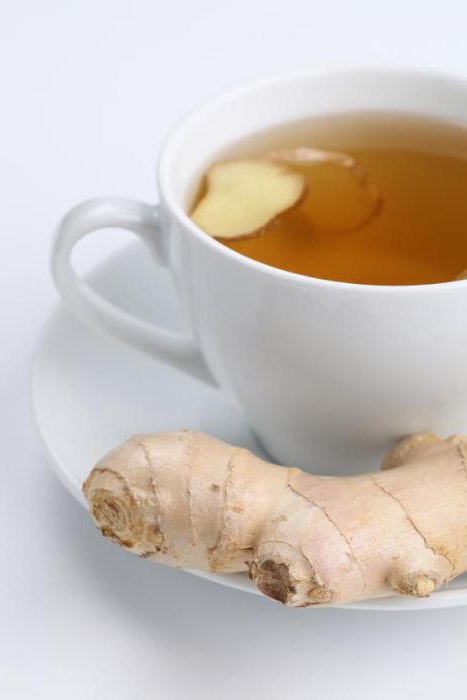
Root benefits for women
Ginger also has beneficial properties and contraindications for women. The plant has a positive effect both on the whole body and on individual human systems. In particular, the root favorably affects the reproductive organs of women, relieves pain during menstruation.
With regular use of tincture of ginger root in women increases sexual desire. It is caused by the fact that the essential oils and lysine, which are present in the plant, increase blood flow and tone up the muscles of the female genital organs.
What you need to know about such a plant as ginger? Useful properties and contraindications. For women - this is a great opportunity to lose weight. Thanks to this plant, toxins are excreted from the body, and fat deposits are burned. The condition for successful weight loss is long-term use of ginger. It can be either tea from the root or its small chips added to the dish. 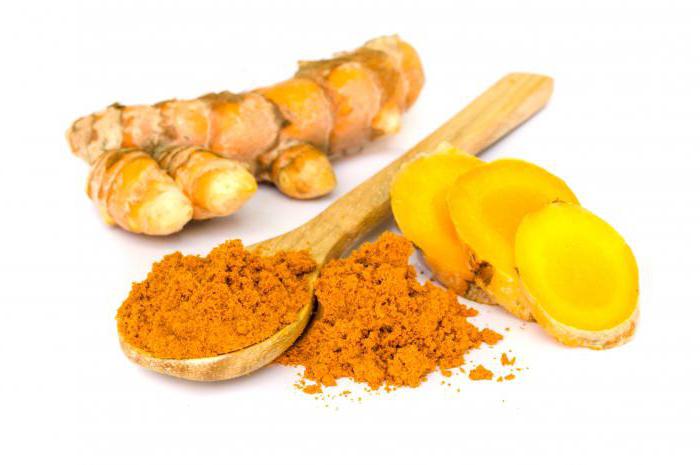
It is important to know that this plant can help in the treatment of infertility. When it is taken regularly, the menstrual cycle is restored. Ginger also helps to normalize female sex hormones in the body.
The plant helps fight depression. Women for various reasons, there are outbreaks of aggression, after which it is difficult to calm down. Also, through suspiciousness, they take any problems to heart. Just in this case, ginger has beneficial properties, and contraindications for women are minimal. Infusion from the root of the plant improves mood and can encourage a person even better than coffee. With long-term use of this medication increases performance.
Benefits during pregnancy
The presence of substances such as phosphorus, calcium, zinc, iron, various salts and minerals in the ginger root favorably affects the future mother's body. In addition, the plant is still appreciated by amino acids, carbohydrates and vitamins.
For a pregnant woman, one of the most beneficial properties of ginger is its antiemetic effect. Reception of the root reduces nausea, thereby allowing the mother to more easily tolerate increased intoxication. 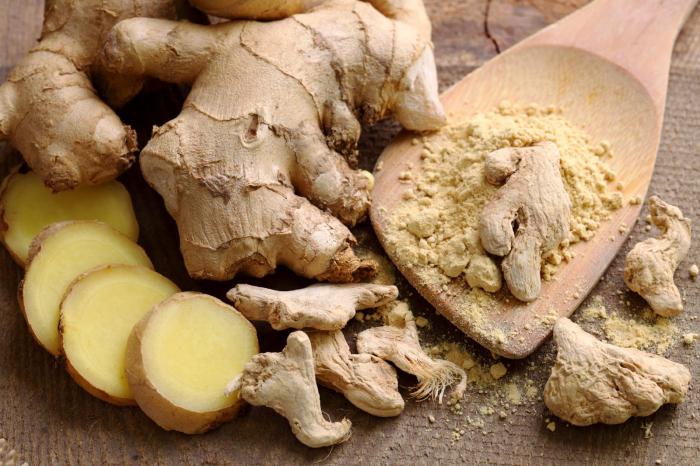
Often pregnant women are prescribed various sedatives. Ginger tea can also have a calming effect on the human nervous system. It alleviates headaches, improves the general condition of the body, fights dizziness, and normalizes well-being.
A common problem for women who are expecting a baby is swelling of the legs. Taking metered ginger root, you can eliminate excess water from the limbs. This will contribute to the removal of the load on the body of the future mother.
Also, horned root is well struggling with disorders of the gastric tract. This phenomenon is quite often observed in pregnant women. The plant belongs to the natural spasmagolics and, accordingly, stimulates the work of the stomach.
A big trouble is for the future mothers colds. After all, when carrying a fetus, it is forbidden to take any strong drugs. Ginger root in the form of tea helps to overcome cold symptoms, and with regular use of it, you can avoid recurring them.
Contraindications
Ginger has some contraindications. So, it is not recommended to use this plant to children under two years of age. It should also be used with caution in people with heart or blood sugar problems. Ginger overdose can cause diarrhea or irritation in the mouth. If the blood coagulates poorly or the preparations are used to dilute it, it is recommended to refrain from using this healing plant.
The main contraindications include:
- duodenal ulcer or ulcerative colitis;
- lactation;
- fever;
- stomach ulcer;
- gastritis.
It is not recommended to use the root for people who have cirrhosis of the liver or stones in the biliary tract. For any bleeding, even from the nose, taking ginger is prohibited, as this will only aggravate the situation. Increased pressure, as well as pre-stroke and pre-infarction states are also grounds for abandoning the root of this plant.
Ginger will not benefit people who are prone to various allergies. Also, the reception of the plant should be abandoned in late pregnancy and in the presence of a history of miscarriages.
It is advisable before consuming ginger root to consult with your doctor, find out his compatibility of the plant with other medications. The first thing ginger is famous for is its beneficial properties. The treatment of this plant is indisputable, but for some people it is strictly prohibited.
Medical recipes
Ginger can be used in different ways. This is a dried root, pickled, and powder from the plant, and pasta. We examined in detail what ginger has beneficial properties and contraindications. The recipes presented below will help you to apply this unusual plant with maximum benefit.
To protect the throat and mouth, you can simply suck on the ginger root, after removing the skin from it. During the process, you will feel a slight tingling. When the concentration of essential oils decreases, you can bite off a piece. Chewing the root will also help relieve toothache and remove unpleasant 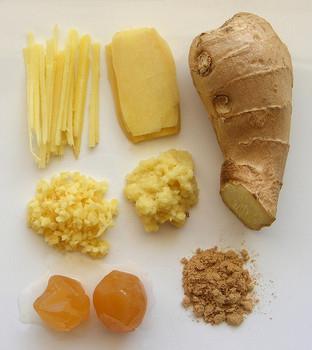
If you add a yarrow, the color of black elderberry and pepper mint to a decoction of ginger, you will get a good painkiller for the abdomen.
To improve digestion and reduce the amount of toxins in the body, you can eat a fresh grated plant with a pinch of salt and lemon juice. Take this medicine should be before meals.
Ginger paste is good for headaches and for chronic rheumatism. To prepare it, mix the root powder with water. The resulting mass is applied to painful places.
Another option for anesthetic is a compress. Mix a spoonful of turmeric and chilli with water, as well as two tablespoons of ground ginger root. The heated mixture is placed on the fabric and applied to the sore back. If you use sesame oil or mustard oil instead of water, then such a compress will help relieve joint pain.
With motion sickness and seasickness, take half an hour before leaving a little ginger and drink a glass of tea or mineral water.
With the help of the root you can get rid of the boil. To do this, apply a paste of ginger and turmeric, taken in equal proportions and diluted with water, at the site of injury.
Taking twice a day a teaspoon of aloe with a pinch of dry root, you can forget about such a disease as hemorrhoids. These are the ginger has beneficial properties. Reviews of this plant are mostly positive.
Pickled ginger
It is desirable for each of the types of dishes to comply with a certain proportion of the root. Now you know a lot about such a plant as ginger: useful properties and contraindications, recipes and methods of treatment. But how to keep this plant at home?
The most popular is pickled ginger, whose beneficial properties and contraindications are preserved in this form. For the preparation of this healthy dish you will need half a kilogram of fresh root, 4 tablespoons of dry rose wine, the same amount of sugar, 2 tablespoons of vodka and 200 grams of vinegar, better than rice. 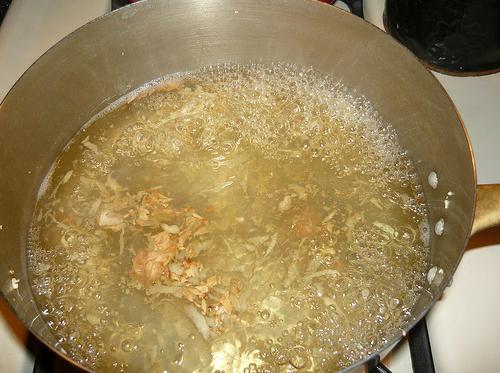
Ginger, pre-washed and dried, peeled and cut into small pieces. Then they are thrown into boiling water and cooked for one minute. The finished root is dried and cut into small slices. For the marinade, mix sugar, vodka and wine and boil until the ingredients dissolve. Next, add vinegar and make the marinade boil. The mixture is poured into a jar of ginger slices, covered with a lid and after cooling cooled in a fridge for three days. There and contraindications can save up to three months. This product has a beautiful pink color.
The root prepared in this way is used both in cooking and for medicinal purposes. The positive properties include:
- amazing spicy aroma, rich in essential oils that whet the appetite;
- the presence of phosphorus, iron, copper, zinc, as well as amino acids - fenilina and tryptophan;
- relieving fatigue, fighting nervous exhaustion, eliminating fear and insecurity;
- slowing the aging process, the removal of toxins;
- fat splitting and subsequent weight loss.
Sugar Ginger
Another popular recipe is Useful properties and contraindications should be found before taking this delicacy. To make candied ginger, you need to take one large root, peel it and cut into small slices, then pour them with water and cook for 30 minutes. You do not need to give the dish to boil strongly, so that ginger in sugar will not lose its beneficial properties. Otherwise, the plant will become useless. 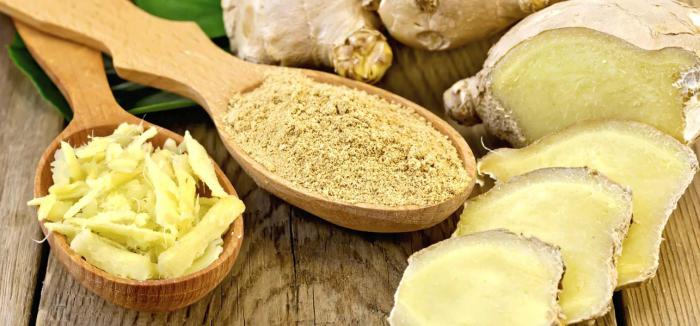
The next step in the preparation of the dish "Ginger in sugar", the beneficial properties and contraindications of which we are considering, is draining the liquid. Then add sugar in the same proportion with the root and cook the mixture until it becomes a transparent color, and a thick syrup is formed at the bottom of the pan.
Ready slices can be rolled in powder and allowed to dry, after which they should be placed in a glass dish. That's it, now we have ginger in sugar! Its beneficial properties and contraindications are as follows:
- root can be used as a dessert;
- it helps fight sore throat;
- has ginger in the sugar has beneficial properties for weight loss;
- is a component for various dishes;
- should not be used in case of renal failure;
- contraindicated when breastfeeding;
- harmful to stomach ulcers.
In addition, it has sugar-based ginger with beneficial properties for weight loss.
Dried ginger
A common dish is dried ginger, while its beneficial properties are more pronounced. To prepare, clean the root and cut into thin slices. Put them on a baking tray, pre-covered with parchment paper. Place the root in the oven and dry at 50 degrees for about 2 hours, then increase the temperature to 75 degrees. The door should be opened to allow moisture to escape. When the root begins to break - he is ready. Dry ginger is recommended to grind in a blender and put in jars where it can be stored for a long time.
In this form, the root retains all its useful properties, plus it is convenient to add it to various dishes.
Ginger is a herbaceous plant that grows in Japan, India, Brazil, Jamaica, Argentina, China, West Africa and Vietnam. Its homeland is the western regions of India and Southeast Asia. Ginger is a cultivated plant that never occurs in the wild. Translated from Sanskrit, ginger "Zingiber" is translated as "horned root".
The period when planted ginger falls on the spring months - from March to April. The ripening period lasts from six months to 10 months, depending on the conditions in which ginger grows. Maturation occurs when the upper leaves turn yellow and fall off. Breeding ginger rhizomes.
It is important to understand that black (“Barbados”) and white (“Bengali”) ginger are one and the same root, the only difference is in the degree of processing. Black ginger is not peeled off, it is scalded with boiling water, after which it remains in its original state. To obtain white ginger, they peel it off, thoroughly clean and treat with a two percent solution. sulfuric acid or bleach. As a result, white ginger loses some of its beneficial properties, it becomes less fragrant and less burning than black ginger.
Ginger has long been famous for its aroma and taste. In Russia, he was extremely popular. It is from ginger that the name “gingerbread” has gone, since ginger was the main component of the famous Tula gingerbread. But ginger was added not only to bakery products. On its basis, mead was brewed, kvass was made, it was added to jam and shot. Ginger added its spicy flavor to dishes, due to which it was always unusually in demand.
So, it's time to learn about the benefits and harm of ginger!
Ginger - a useful composition
Ginger has a lot of useful properties, as it contains many vitamins and nutrients. Here is a partial list of substances that are an integral part of ginger root: magnesium, phosphorus, sodium, silicon, potassium, manganese, calcium, germanium, chromium, iron, aluminum, nicotinic acid, caprylic acid, oleic acid, linoleic acid, vitamin C, aspargin, choline the fats. It contains many amino acids that must necessarily be present in the body, such as: leisin, methionine, threonine, phenylanine, valine and tryptophan.
The main components of the ginger rhizome are sugar, starch, zingibern, gingerol, cineole, borneol, phellandrene, camphene, citral, linalool, and bisabolic acid.
The ginger contains a substance - gingerol. It is to this phenel-like substance that ginger owes its burning specific taste.
Due to the presence of essential oils in the ginger root, it is extremely fragrant.
Ginger - low calories. Per 100 grams of ginger root accounts for only 80 kcal.
By the way, this is how ginger blooms:
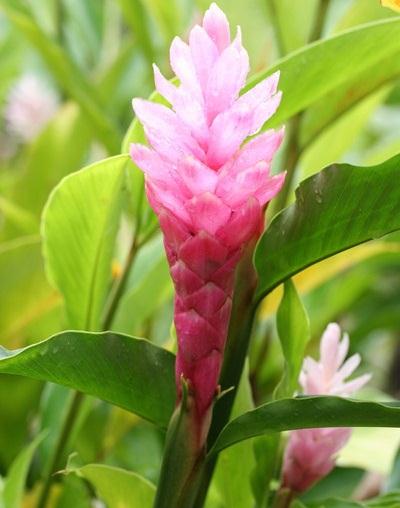
Ginger - useful properties
The beneficial properties of ginger are quite extensive. It is used for the treatment and prevention of many diseases.
To begin with, ginger has a very positive effect on digestive system. Apart from the fact that ginger gives dishes a special taste, it makes food easily digestible for the body, eliminates indigestion and belching, stimulates the production of gastric juice and normalizes gastric secretion. If you regularly eat ginger, the person gets an appetite.
Ginger is the prevention and treatment of various colds, as it stimulates expectoration, and in the manufacture of decoction based on ginger is an excellent warming agent. Ginger is good against pathogenic bacteria, has anti-inflammatory and soothing effect, besides strengthens the immune system.
The beneficial properties of ginger also apply to patients with bronchial asthma, and since it has healing properties, it is used to treat skin diseases.
Especially beneficial ginger affects the blood vessels, strengthens and cleans them, reducing the level of cholesterol contained in the blood. It is a good help in the treatment of atherosclerosis and strengthens memory. Reduces pressure. Good effect on performance and with regular admission gives a surge of strength and vigor. Serves as a prophylactic against thrombosis and stroke.
Ginger relieves joint pain, muscle aches, swelling and helps in the treatment of rheumatism, arthritis and arthrosis.
For women, ginger is especially beneficial. Substances included in its composition, relieve convulsions, which occasionally accompany the menstrual cycle; assists in the treatment of infertility, favorably affects the uterus. Ginger root relieves the symptoms of toxemia: nausea, dizziness and weakness. That is why it is recommended to take it not only for pregnant women, but also for people suffering from "seasickness".
Ginger refers to aphrodisiacs, i.e. contributes to increased sexual desire.
It is believed that ginger is effective for the prevention of cancer and contributes to the inhibition of tumor growth.
Ginger - ethnoscience
For the treatment of various diseases of the root of ginger, traditional medicine offers many recipes.
Using ginger powder and mixing it with a small amount of water, a compress is obtained, which is used for headaches and chronic rheumatism. Ginger powder also helps with back pain. By mixing half a teaspoon of chilli pepper and a teaspoon of turmeric with ginger powder and water, we get a mixture that needs to be slightly warmed, then laid out in a fabric bandage, applied to the affected area and fastened carefully. This mixture is used not only to relieve back pain, but also for painful sensations in the joints. Only in the manufacture of a compress for the joints is recommended to replace the water, which is diluted mixture with vegetable oil, preheated.
Baths are very helpful in relaxing, relieving pain and aching muscles. But if you add a decoction based on ginger to the bath, it will be several times more useful. One bath comes a liter of boiled water with 2-3 tablespoons of ginger powder. Before you pour the broth into the bath, it must be boiled for about 10 minutes.
If you suffer from gastric upset, a mixture of nutmeg and ginger, added to natural white yogurt, will help eliminate discomfort. Enough half a glass of yogurt and a quarter of a teaspoon of a mixture of nutmeg and ginger.
In order to get rid of weakness, nausea and dizziness, which are common symptoms of seasickness, you need to take half a teaspoon of ginger and mix it with tea or water, preferably half an hour before meals. Also, this recipe will help pregnant women get rid of the unpleasant symptoms of toxemia.
Ginger is a reliable prevention of diseases of the mouth and throat. We must act as well as with the usual pharmacy medication. Put a small piece of ginger in your mouth, sucking slightly, until the throat starts to pinch. Later a little bite.
The beneficial property of ginger, which is the qualitative destruction of pathogenic microbes, can help with pain in the teeth. To do this, thoroughly chew a small piece of ginger and put it on a sore point. Besides the fact that ginger will clean the place where germs will be located, after it it will leave a pleasant spicy aroma.
Preparing a special paste of ginger, water and turmeric, you can pull the pus out of boils, thereby clearing the place of their localization. It is enough to put a little of this paste on the affected places. Ginger has an anti-inflammatory and cleansing effect that will help to disinfect and heal the affected area as quickly as possible.
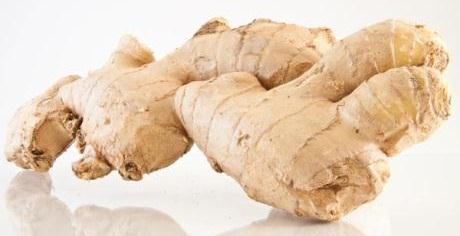
Ginger - contraindications
There are many useful properties of ginger, but there are also circumstances under which taking ginger is fraught with complications.
Ginger, entering the body, very strongly affects the internal organs. Especially on the mucous membrane of the stomach and intestines. Therefore, ginger and people suffering from gastritis and duodenal ulcers, ginger is contraindicated, as it can exacerbate the situation.
It is not recommended to get involved in ginger and in the presence of liver diseases such as cirrhosis, hepatitis, stones in the biliary tract. The substances in the composition of ginger contribute to sticking stones in the aisles to such an extent that this may require the intervention of doctors.
Ginger can increase bleeding. Starting from the usual nosebleeds and ending with bleeding hemorrhoids - ginger not only does not help, but will make it much worse.
Pregnant women who suffer from toxicosis are recommended to take ginger to relieve symptoms.
Ginger contributes to the generation of heat in the body, which is good for colds and is extremely harmful at high temperatures.
Before eating ginger, make sure that you do not have an allergic reaction to it to avoid undesirable consequences.
Ginger - a combination with drugs
Typically, ginger in combination with various drugs gives a positive result. But, alas, it happens not in all cases. There are drugs that can cause unwanted effects with ginger, so before you start taking ginger, it is safer for your health to first consult with your doctor.
So, drugs that lower blood pressure, stimulate the heart muscle and those that are called antiarrhythmic, combined with extreme ginger is undesirable. Ginger will increase the effect of these drugs so much that in most cases an overdose occurs. Since drugs that affect the heart and blood vessels are potent, this can lead to dire consequences.
It is undesirable to use ginger for diabetics who take various drugs that lower blood sugar levels.
If a person takes drugs, the main function of which is to slow down blood clotting, then in combination with them ginger cannot be used, since it has the same properties and can lead to an overdose.
Ginger - a plant with a huge number of useful properties. But, like everyone, he has contraindications. Take it wisely and then it will bring you only benefit.
Ginger Cooking
Ginger has long been added to food, giving it a special taste and aroma. Especially often it is used as a seasoning in various first courses: vegetable, meat, fish and even fruit soups. Do not do without ginger and some porridge. Often, ginger is used as an aromatic seasoning for roast. It is ideal for almost any kind of meat, be it pork, beef, duck, lamb, veal, chicken or turkey. Recently it has become very popular dish called sushi, which is usually served pickled ginger. In vegetable dishes, ginger is also welcome. Most often it is added to the composition of stuffed vegetables (tomatoes, zucchini, cucumbers, peppers, eggplants, etc.) and various dishes made from mushrooms.
Ginger is widely used as a component of various beverages. It is added to compotes, and tea is made on its basis.
In the preservation pieces of ginger are placed in a jar of cucumbers, melons, pumpkin. On its basis, make sauces.
Sometimes ginger root sugared. Then it is suitable for making jam, marmalade, candied fruits and sweets of the most different types.
And do not even count how much ginger is used in the bakery industry, for the manufacture of various buns, pies, muffins, cakes and other things.
The use of ginger was found even in the alcohol industry, where it is used to produce liqueurs, punches, as well as ginger beer, which are famous for their bitterness.
Ginger - how to clean?
It is known that immediately under the skin of ginger contains the greatest amount of nutrients, so it must be cleaned very carefully, scraping the minimum layer with a knife. Just like a carrot.
Ginger tea with lemon
On the basis of ginger make a pleasant tea with taste. This tea is unique in that three flavors can be distinguished in one composition: sweet, sour and spicy, and besides, it has a warming effect. That is what makes you cheer when it is adopted.
How to cook it? Watch the following video from the program “About the Most Important” about ginger and its beneficial properties:
By the way, it is not necessary to insist on it for a whole hour - this is just one of the recipes, you can even 10 minutes, try it.
How to choose ginger
Compared to many vegetables and fruits, the choice of which you need to focus on many visible and invisible criteria, the choice of ginger root is extremely simple. Determine the degree of freshness can be visually. If the ginger root has a smooth, intact, smooth surface with a golden peel, it is safe to say that the root is fresh. Old and poor-quality root is easily identified by thickening, tuberosities and by the presence of eyes, which are very similar to potato ones.
It is worth noting that ginger, the beneficial properties of which we have considered, is best bought as a root, and not crushed or pickled (least preferred). After all, it is the root that contains the maximum of useful substances!
Ginger - how to store?
In a refrigerator:
Ginger root is stored for a long time, but gradually loses its beneficial properties and subsequently becomes half as not as useful as it could be if it were in a fresh state. It is advisable to store it no longer than 4 - 6 days on the lower shelves of the refrigerator or in a special compartment for vegetables.
In the freezer:
It is believed that when storing ginger in the freezer, it retains all its beneficial properties and qualities. For more convenient storage, it is best to put the root in a plastic bag in whole or ground form. If you grind ginger root, you put it in a package in the form of a thin tile, then you can simply break off a piece of the size you need.
Dried Ginger:
But in dried ginger can be stored for several months.
In conclusion, watch another video about ginger and its useful properties from the program “Live healthy”:
